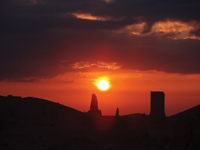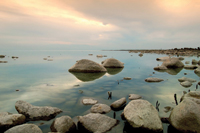
The World Travel & Tourism Council (WTTC) forecasts that the contribution of travel and tourism to Syria’s GDP will rise from 11.2 per cent ($4.67bn) in 2009 to 13 per cent ($7.7bn) by 2019.
“Despite a slowdown in 2009, the Syrian economy is forecast to post average real GDP growth of 4.1 per cent in 2010-11. Expansion in services GDP is expected to be driven by a large increase in tourism receipts. This bodes well for the hospitality sector in Damascus,” said Robert O’Hanlon of Deloitte & Touche Middle East.
In the first quarter major hoteliers noted a year-on-year dip in occupancy levels and business, a phenomenon reflected in data from STR Global, a company specialising in tracking market data relevant to the hotels industry, showing first-quarter occupancy levels in Damascus at 48.8 per cent, down from 61.3 per cent in the first quarter of 2008.
“In January and February our occupancy rates were noticeably low, but by March, April and May it picked up, which is normal as that is the perfect season for groups,” said Sawsan Shakra, the director of sales and marketing for Sheraton Damascus Hotel.
Martin Rhomberg, general manager Four Seasons Hotel Damascus added: “Our occupancy was in the mid-50-per-cent range in 2009 and we anticipate that we will see between 10 and 12 per cent growth in 2010.”
 |
|
Sunset over Palmyra |
Despite a softer start to 2009 following the events in Gaza and the economic situation globally, there was a continuing recovery for the market as the year progressed, according to Rhomberg.
“The hotel took a proactive approach in increasing the number of food and beverage promotions held and worked closely with our key customers to ensure we were able to maintain and stimulate business throughout the year,” he said.
And he continues to be cautiously optimistic for 2010 saying: “There are signs that there will be an increase in the number of visits, launches, openings, corporate meetings and social gatherings – there’s an upbeat feeling right now and we think that will have a positive effect in 2010.
“For the future we will continue to position Damascus as an easily accessible and attractive destination for both GCC and European countries; cater to local demands for new culinary experiences and innovative promotions and activities and further strengthen the hotel’s positioning and leadership in service delivery and product excellence.
“Continued focus on our product enhancement programme will enable us to further build on the guest experience and we will continue to actively build on our corporate social responsibility programme.”
Overall arrival figures continue to rise for Syria. Total tourist figures for 2009 indicate 6.09 million visitors, up 12 per cent year-on-year. Of the total, 3.59 million were Gulf Arabs, 1.4 million non-Arabs and 1.06 million were Syrian expatriates. Total nights spent in hotels by tourist groups saw a 17 per cent increase from those registered in 2008. Gulf Arab tourist numbers rose 16 per cent in 2009, with the main increase witnessed among Saudis (18 per cent) and Bahrainis, Kuwaitis and Emiratis (15 per cent each). European tourists totalled 772,031, up 25 per cent year-on-year. This was led by the Dutch (up 31 per cent), followed by the British (26 per cent), Italians and French (both up 25 per cent), and Swedes (24 per cent).
According to Saadullah Agha Al Qalaa, Minister of Tourism for Syria: “Until now, around 90 per cent of the country’s tourism investment has been focused on Damascus, Aleppo and the coast. As Europeans are coming to Syria for tours all around the country, and not just to one specific destination, we are currently building new products in underdeveloped parts of the country that hold potential for new types of tourism.
“These include ecotourism, desert tourism, river tourism, sport tourism, rural tourism, Bedouin tourism and more. We are now encouraging investors to convert old palaces and houses to boutique hotels in the old cities of Damascus and Aleppo, as well as upgrading and promoting the services on offer in places like Palmyra, Bosra, Hama and San Simeon so they can become similar destinations to Damascus and Aleppo.
“Visitor arrival has been growing at 13 per cent a year, so the number of total visitors coming to the country each year is expected to double every five years. We estimate to have around $4-billion worth of tourism infrastructure in place and around $5 billion under construction, so we are doubling our capacity to keep pace.”
In the Damascus hotel sector, the most notable development in 2009 was the handover of the management of Le Meridien Damascus to the Turkish group Dedeman Hotels & Resorts International.
 |
|
Homs Lake |
In 2009 works were under way on the sites of the future Mövenpick, Holiday Inn, InterContinental and Rotana hotels. Of these brands only Rotana has an existing presence in the country, with the Queen Centre Arjaan by Rotana in Damascus and the 136-room Afamia Rotana Resort in Latakia.
Hotel locations in the capital are diversifying, due to the limited availability within the city centre and also in line with Mövenpick, which is situated 10 minutes from downtown in Kafr Sousse, a newly-developed area of the city with easy access to central Damascus. In 2010 the Sheraton Damascus will undergo its first refurbishment since it opened three decades ago.
An InterContinental hotel will form part of a mixed-use development known as the Kiwan project. The project is being developed by Kuwaiti Kharafi Group and is on track to open in 2012. Holiday Inn will open just a few minutes’ walk from the Souq Hamdiye, by early 2011.
Kempinski, had previously announced three projects, the Khan Sulaiman Pasha boutique hotel in the Old City, the Kempinski Hotel Damascus and the Kempinski Al Hayat in Mazze, which were cancelled earlier this year. This does not mean, however, that the company’s interest in the Syrian market has ended. “We are continuing to look for good hotels in Damascus and Syria remains an important market for us,” Ulrich Eckhardt, president for the Mena region, told local press.
The issue of human resources continued to pose a serious challenge to the sustainability of the tourism sector in 2009. Last year a new private sector consultancy firm, Markaz for Tourism Development, was launched with the aim of improving training and human resources. The company is the first of its kind in Syria and is working both with public sector and private sector clients.
It has begun working with the Ministry of Tourism on a project to train people in the promotions department of the ministry. This year Markaz will also launch a series of annual reports, providing analysis of the tourism market.
In its favour, the country is considered a relatively inexpensive destination, ranked fifth in the world for the price competitiveness of its travel and tourism industry, as well as a safe one being ranked 23rd for safety and security, with the world’s lowest costs associated with crime and violence.
*Information features in The Report: Syria 2010, which is published by Oxford Business Group, the global publishing, research and consultancy firm.
